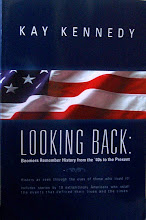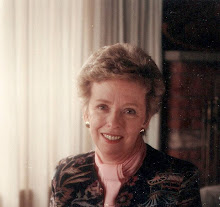As I sent the book Looking Back to the editor, I expected to be finished with it except for making the changes she suggested. Instead, one important, historical news item after another has filled the airwaves during the past week, and some of them seem to be important to the book's promise to cover history from the '40s to the present.
For instance, yesterday the Supreme Court turned back the clock on racial integration. So in the year of the 50th anniversary of school desegregation in Little Rock, racial diversity is no longer a goal of our society. Apparently, neither is equal education for all, because that will certainly change as many parents rush to move their children to new, segregated schools.
I wouldn't have expected to be bothered by this ruling. After all, it wasn't unexpected. Why does it disturb me?
Well, 50 years ago this September, I was one of the 2000 white students at Little Rock Central High who had our lives turned into a media frenzy by the forced integration of our school when nine black students were admitted. We lived a year filled with fear, pain, and humiliation as we watched on TV nightly as mobs of racist bigots, with the help of an over-zealous mob of photographers and reporters, turned what would probably have been a non-event, or at least a less dramatic moment in history, into a media circus.
We faced almost daily bomb threats, and had to nervously stand around outside while all lockers in the building were searched for explosives. We lived in fear that our school would suddenly be bombed, or closed down by politicians trying to placate their most vocal voters. Our parents were frightened out of their minds as they sent us off to school each day to face, what? No one knew for sure.
We students had no voice in what was happening. We were merely victims of a Court ruling and were suddenly picked out of a lottery of faceless young people to become guinea pigs for that first experiment in integration in the South. We were forced to grow up—to prove that we were more adult than the racists who waved signs and shouted in front of the school each day. And yes, we were scared. Yet, more than 600 seniors managed to graduate that year, along with one black student.
Students the next year weren’t so lucky. Schools were closed down and some dropped out. Others were forced to live with relatives out of town or else their parents had to pay for them to attend private schools.
That is the price we paid. Now, after all these years, we find that it was all for nothing. A Supreme Court that is out of touch with the real world, real lives, of people in this country, both black and white, has decided that racial diversity doesn’t matter. So, if parents want their kids to live in an all-white (or black, or Asian, or Hispanic) community and not have exposure to others of different races, they can move to segregated neighborhoods where they never have to rub shoulders with someone different from them.
Unfortunately, that’s not the real world. Well, yes it is in some exclusive gated communities like where Supreme Court Justices live, but do the rest of us really want things to be like they were back before integration? Personally, I think my life has been richer for knowing people of all races. How would I have survived moving to Honolulu in 1964, where white faces were few and far between? What would I have done when I was sent to a black home as an interior designer? Refuse to go in? Walk in and say, “Hi, oh I see you’re black. Too bad. Goodbye”?
Right now, I’m thinking this is the scariest thing our Supreme Court has ever done—even more frightening than the 1954 Brown vs. Board of Education was to those of us in the South at the time. Maybe I’m over-reacting, but I worry about more race riots and violence, more hatred and less respect and understanding of others. I hope I’m wrong.
The sad thing is, I can see the point of parents who don’t want their children bused out of their own neighborhood. It has to be hard to put a child on a bus early each morning and not have her or him come home until late. But, as I write in the book, no ethical question is either black or white. There are all shades of gray when these types of problems face us. I feel with this decision, the Supreme Court has created a situation that will haunt us all for a long time.
And I’m mad about having gone through all I went through at Central High, only to find out 50 years later that it was all for nothing. I'm mad about the sacrifices we made, and for what? What had been accomplished has been erased by this decision, and justice has not been served by the “Justices.” If they’re concerned at all about the future, they should realize we’re a nation where the Caucasian race will soon be a minority. Isn’t it important that we be exposed to other cultures, other races, before we become the minority?
You can read all about Central High in 1957 in the book, Looking Back, when it is released in July (or possibly, August). In it are essays by two other students who were there that year. In all, 22 exceptionally expressive essays and poems on a wide variety of historic events provide personal insight into the times that shaped Boomers’ lives, and the lives of all of us.
I’ll list the essays as soon as the book comes out so readers can get a sense of the moments contributors felt affected their lives. They're all wonderful!
Friday, June 29, 2007
Sunday, June 10, 2007
New Book: LOOKING BACK
LOOKING BACK:
Boomers remember history from the '40s to the present
History as seen through the eyes of those who lived it!
Boomers remember history from the '40s to the present
History as seen through the eyes of those who lived it!
History was the most boring subject I studied in school because I couldn’t understand how it related to me. I hadn’t been to any of the places history books spoke about, and memorization of dates and names was meaningless to me.
Then I realized one day that my generation had lived through some of the most exciting, and at times appalling and frightening moments in history. I also came to realize that the one important element missing in all history and civics lessons is the personal perspective of those who actually witnessed those historic events. Were they bothered by a specific moment in time? What was its emotional impact? Did it change their life in any way?
To document their view of history since World War II, a group of writers and extraordinary Americans recount their memories of pivotal moments since 1940 along with their personal thoughts about what happened. And I attempt to provide an overview of events along with a basic timeline, and offer my own comments about the incidents that I witnessed firsthand, or that most affected me. My personal recollections include the integration of Little Rock Central High, 1957, where I was a student at the time.
We were there. We witnessed history as it happened, and we sometimes suffered anxiety over tragedies like assassinations, wars, political wrongdoing, riots, and civil unrest that, at times, threatened our democracy. We also shared moments of sheer joy as we watched the first man walk on the moon. We observed (and some of us participated in) the counter-culture that rocked our safe, orderly existence. Then on 9/11, we were shattered by a terrorist attack on our own soil that revealed our nation’s weaknesses and vulnerability.
History is anything but boring. It is an exciting, living document! We Americans are in danger of forgetting our past if we don’t all take responsibility for passing on the legacy of this country's wonderful history and our shared heritage of courage, honor, and bravery.
My new book, titled: Looking Back: Boomers remember history from the '40s to the present - History as seen through the eyes of those who lived it! will be available this summer. Look for information on its release and availability on this blog, or contact me at portable.writer@yahoo.com.
This book will be an important contribution to our nation's collection of historical documents because it will be told from a personal perspective, emphasizing human emotions and consequences for every historic moment that we’ve survived. I hope everyone will buy a copy for your family and share it with your children, grandchildren, and schools.
Monday, June 4, 2007
Coming Soon: "Looking Back"
My new book, "Looking Back: Boomers Remember History from the '40s to the Present" should be available in July 2007. It presents "history as seen through the eyes of those who lived it" and includes essays and poems that offer a rare, personal perspective on an era that changed society.
Covered in the book are pivotal historic moments from World War II through Hurricane Katrina. Seventeen essays and two poems recall the triumphs and tragedies that affected the boomers' generation, and reveal the individual emotions attached to those times. This book doesn't just contain the cold, hard facts expected to be found in a textbook. And it doesn't document historical moments but leave out the emotional impact of those moments on individuals. Instead, for the first time history readers will discover not only what happened, but how real people's lives were touched. There's even a final chapter that talks about challenges Americans will face in the future.
From World War II through the innocence of the late '40s and early '50s, to the shattering terrorist attack on our shores on 9/11, readers will discover a unique opportunity to walk in the footsteps of history.
Watch for an announcement about the availability of Looking Back on this blog, or at my website: www.kennedyk.com.
Covered in the book are pivotal historic moments from World War II through Hurricane Katrina. Seventeen essays and two poems recall the triumphs and tragedies that affected the boomers' generation, and reveal the individual emotions attached to those times. This book doesn't just contain the cold, hard facts expected to be found in a textbook. And it doesn't document historical moments but leave out the emotional impact of those moments on individuals. Instead, for the first time history readers will discover not only what happened, but how real people's lives were touched. There's even a final chapter that talks about challenges Americans will face in the future.
From World War II through the innocence of the late '40s and early '50s, to the shattering terrorist attack on our shores on 9/11, readers will discover a unique opportunity to walk in the footsteps of history.
Watch for an announcement about the availability of Looking Back on this blog, or at my website: www.kennedyk.com.
Subscribe to:
Comments (Atom)

